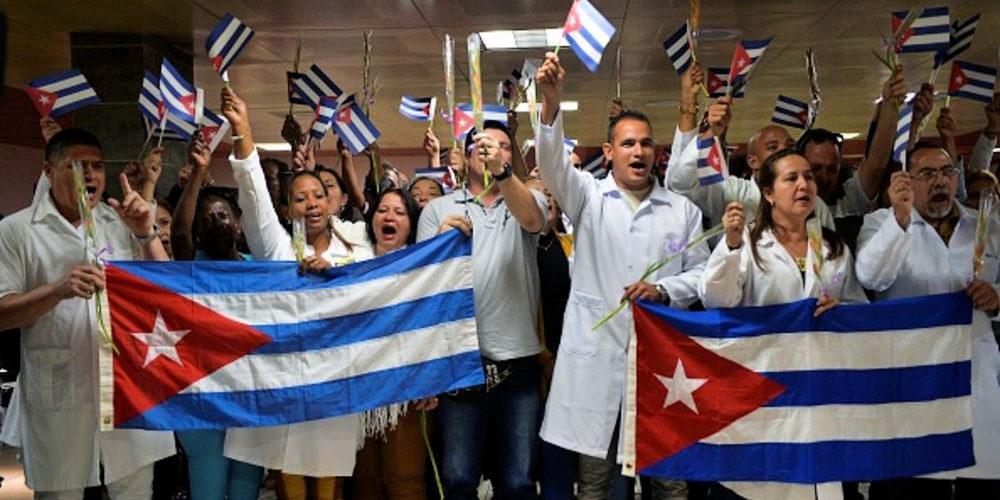On 11 March, Cuba had the first three cases of covid-19, detected in three Italian tourists. From that moment the country began to implement the contingency plan for dealing with this virus, which had been developed months earlier.
At the time of writing [24 April] the country has 1,285 people infected, has had 44 deaths and more than 2,000 people isolated because they are suspected of having the virus.
Regarding whatever measures are required to tackle the virus, President Miguel Díaz-Canel declared: “No-one will be left helpless.” The health facilities developed by the Revolution are well placed to respond effectively. The statistics are, by any standard, impressive: medical offices 10,869, doctors in communities 13,070, polyclinics 449, hospitals 150, doctors 95,487, nurses 85,732, plus a host of medical technicians and support staff.
Cuba has an average of nine doctors per thousand inhabitants, unequalled anywhere in the world. It is with these resources and political will that Cuba faces this epidemic.
Ironically, we have to thank, to a large extent, the last twelve US governments. The more than sixty years of aggression and blockade by the United States have developed in the Cuban people a great sense of unity, discipline, and solidarity. Its powerful mass organisations are valuable means of educating and organising the whole people, and there is great communication between the people and the government. Every day the president and the Council of Ministers meet, analyse the situation in the country, and act accordingly. The government-people chain of information and actions works efficiently. We act like a country at war. That has been our historical experience.
There were no signs of relief from US sanctions and this inhumane policy, despite the recent urgent pleas from senior United Nations officials. In the months leading up to the covid-19 pandemic Cubans were already experiencing shortages of oil and commodities, such as soap and food, thanks to the tightening of the US blockade. Cuba also suffered from a shortage of some of the materials needed for its biotechnology industry.
Despite the blockade, Cuban doctors work in 59 countries around the World, 37 of which have confirmed cases of covid-19, including countries in Latin America, Africa, and the Caribbean, as well as Italy and the Principality of Andorra.
In addition, the world can count on more than 29,000 doctors who graduated in Cuba and who, after their training at the Latin American School of Medicine and other Cuban facilities, contribute in their own countries to fighting the epidemic.
The Cuban health sector is highly developed—a priority of the triumphant Revolution in 1959. “Health is an issue of paramount importance for Cuba, which is why we defend the right of all human beings to receive quality medical care,” said the minister of foreign affairs. “Therefore, solidarity is a principle defended by Cuba and our people during more than sixty years of Revolution . . . The benefits are distributed globally; some 400,000 Cuban medical professionals have worked abroad in six decades, mainly in poor countries, providing free medical care at the point of delivery.”
In another example of Cuban solidarity, a British cruise ship was allowed to dock at the Cuban port of Mariel after being refused permission by several other Caribbean countries and by the United States. The ship had five positive cases and at least twenty additional passengers and crew members who were symptomatic isolated on board.
Britain’s secretary of state for foreign and Commonwealth affairs, Dominic Raab, thanked Cuba’s government for its assistance, saying, “We are very grateful to the Cuban government for swiftly enabling this operation and for their close co-operation to make sure it could be successful.”
Cuba’s minister of foreign affairs, Bruno Rodríguez, said: “These are times of solidarity, of understanding health as a human right, of reinforcing international co-operation to face our common challenges, values that are inherent in the humanistic practice of the Revolution and of our people.”
In opposition to this human praxis, the United States continues its inhuman policy of blockading Cuba. A medical aid cargo from the Chinese businessman Jack Ma headed for Cuba was stopped by the US blockade legislation—despite the fact that medical aid is in theory exempted from US sanctions. The donation, consisting of test kits, face masks, ventilators, and gloves, was unable to proceed to Cuba because the airliner carrying the medical supplies was owned by Avianca Airlines, which has a major American shareholder and therefore is subject to the US legislation.
A small Caribbean island, underdeveloped by centuries of colonialism and imperialism and subjected to punitive and extraterritorial sanctions by the United States for sixty years, Cuba has much to offer the world. Cuban television often shows a beautiful image: a photograph of the passengers on the British cruise ship raising a sign that says Yo te quiero, Cuba (I love you, Cuba).
A Cuban song, a hymn to love and human solidarity, says, “Who says that all is lost? I offer you my heart.” This is how we Cubans fight covid-19: organised, supportive, and offering our hearts and love, confident that a better world is possible.
■ Javier Domínguez, a former combatant with the Cuban internationalist mission to Angola, worked for the Cuban Institute for Friendship with the Peoples (ICAP), generating international solidarity. He visited Ireland twice in the mid-1990s, working with the Cuba Support Group. He lives in Havana.






